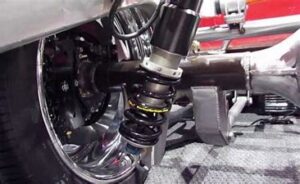Have you ever been enjoying a pleasant drive in your car when suddenly a dreadful screaming sound can be heard? It sounds like metal scratching against metal and can be very unsettling. Well, if this has happened to you before, you’re not alone. Many motorists have heard that metal screeching sound when driving, and in this article, we’ll examine what it means and why it occurs.
What is the purpose of this screeching? Basically, your automobile is trying to tell you something isn’t quite right when you hear that loud noise while driving. It might be an indication of a number of different problems with your car, and figuring out what those difficulties are is the first step in solving them. Simply put, we’re here to assist you in identifying the source of that grating metallic scream and offering solutions.
Table of Contents
What Does Screeching Sound Mean?
Before learning about the specifics of metal screeching sound when driving. Let’s see the basics first. When you’re on the road, your car creates a high-pitched, obnoxious noise that sounds like metal screeching. It’s not a pleasant sound, and it may be rather obnoxious and loud. Consider how your car might be trying to alert you to a problem by creating this screeching noise.
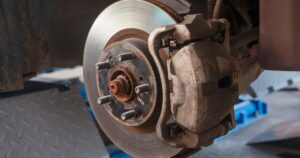
This noise typically originates from a variety of automotive components, including the suspension, belts, and brakes. These auto parts seem to be communicating with you and saying, “Hey, there’s a problem here!”For instance, your brake pads may produce this noise to alert you if they need to be replaced.
The message your car is sending to you when you hear this metallic screeching is, “Pay attention! Something needs to be fixed. To maintain your automobile operating smoothly and silently, it’s crucial to not ignore it and have a professional check it out.
Reasons Behind The Metal Screeching Sound When Driving Your Car
There are a few typical causes for the irritating metal screeching noise you hear when driving. Let’s summarize them in clear terms:

1. Damaged Brake Pads:
The most frequent reason for metal screeching sounds is brake pad wear. A metal wear indicator that strikes the brake rotor when the brake pads get too thin makes a screaming sound to signal that it’s time for a repair.
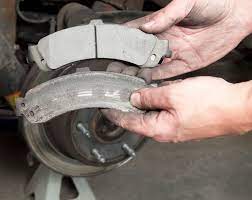
2. Worn-Out Or Slack Belts:
Drive belts that are loose or worn, like the serpentine belt, can also make a screaming sound. These belts are essential for driving numerous car parts, and they make a loud noise when they slip or start to deteriorate.
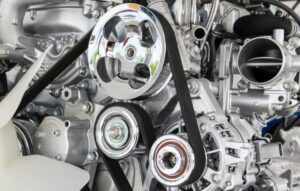
3. Suspension Problems:
Metal-on-metal contact can come from worn or damaged suspension parts, such as control arm bushings or ball joints, and generate screeching noises when the vehicle drives.
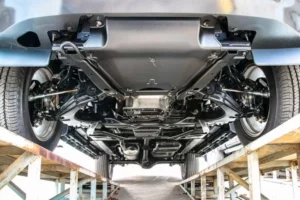
4. Wheel Bearings:
A metallic scream can be produced by worn wheel bearings, especially when turning. These parts enable quiet wheel movement, and as they age, friction and noise levels rise.
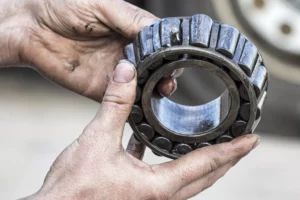
5. Issues With The Exhaust System:
As the car travels, rattling and screaming noises might be caused by loose or rusted exhaust system parts, such as heat shields.
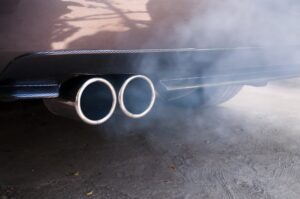
Therefore, understanding the reasons behind your car’s screaming noise can enable you to have it corrected and enjoy a quieter, safer journey.
Is It Safe To Drive A Car With Metal Screeching Sound?
Driving should be avoided if you hear metal screeching in your car since it is unsafe. This noise frequently signals a potential mechanical problem, some of which may endanger your vehicle’s performance and safety. For instance, a screeching noise could be an indication that your brake pads are wearing down, which can drastically restrict how effectively you can stop. Ignoring this could result in farther stopping distances and a greater likelihood of collisions.

Furthermore, unstable or damaged suspension parts or worn-out wheel bearings might affect your car’s handling and stability, making it unpredictable on the road. To guarantee your safety and the safety of others, it’s critical to address the cause of the screeching noise as soon as possible by having your car evaluated by a certified mechanic.
Solutions To Fix The Metal Screeching Sound In Your Car
It can be unsettling to hear a bothersome metal screeching sound when driving. Find simple alternatives to quiet this noise and make the ride more comfortable.
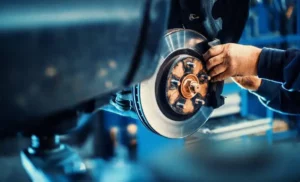
1. Replacement Of Brake Pads:
It’s time to replace those worn-out brake pads if your brakes are the cause. Metal-on-metal contact is avoided by this quick modification, which also guarantees secure stops. Avoid delaying because driving with worn brake pads can result in more expensive repairs.
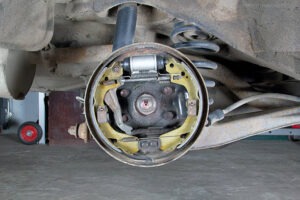
2. Checking And Replacing The Belt:
Drive belts that are loose or worn out may be the cause of the noise. If necessary, mechanics can check them out and replace them. Keep up with your belt maintenance to keep your engine operating smoothly.
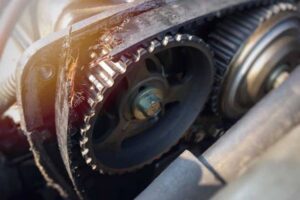
3. Suspension TLC:
A noisy suspension might make your journey unpleasant. Consult a specialist if you think your suspension may be having issues. They’ll pinpoint the problem, which can be as straightforward as swapping out a worn-out component. Expect a quiet, comfortable ride.
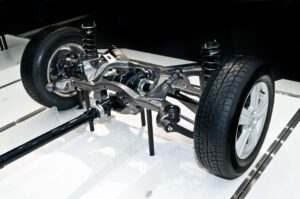
4. Care For Wheel Bearings:
Wheel bearing failure might result in a loud noise. It’s critical to replace them right away. If you ignore this, you risk further harm and a costly repair fee.
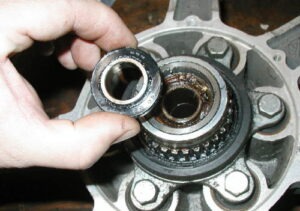
5. Repairs To Exhaust Systems:
Your exhaust system’s loose or damaged components may likewise produce a screeching symphony. To enjoy a quieter drive and more fuel efficiency, have it inspected and fixed.
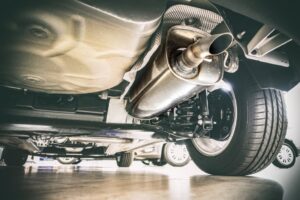
Therefore, remember that taking care of these problems quickly will help you save money and gain peace of mind. Maintaining your vehicle regularly is your ally in avoiding screaming noises.
What Is The Repairing Cost To Fix The Issue?
Depending on the root of the problem and the amount of damage, the cost of fixing the metal-screeching noise in your automobile can be very different. In general, the following cost ranges are approximations:

- Replacement of brake pads costs between $100 and $300 per axle (labour only).
- Belt replacement costs range from $50 to $200 (labour only).
- Suspension repairs might cost anywhere from $100 and $500 or more depending on the exact component and the severity of the damage.
- Wheel bearing replacement costs range from $150 to $350 per wheel (labour only).
- Exhaust system repairs: Depending on the location and degree of the damage, costs might range from $100 for modest repairs to several hundred dollars for a completely new exhaust system.
Please be aware that these are merely estimates, and that actual costs could change based on your location and the type and model of your car.
How To Prevent The Metal Screeching Sound In Future?
Take into account the following proactive measures to keep your automobile quiet and smooth and stop future metal screeching noises:
1. Continual Upkeep:
Maintain a schedule for routine maintenance. This covers regular belt replacements, suspension checks, and brake inspections. Early wear and tear repair can stop screaming noises from emerging.

2. Good Components:
Use high-quality parts that are recommended for your vehicle’s make and model when changing components. Poor quality components may wear out fast and cause noise problems.
3. Suitable Lubrication
Make sure to grease moving components including hinges, bushings, and wheel bearings. Proper lubrication decreases noise and minimizes friction.
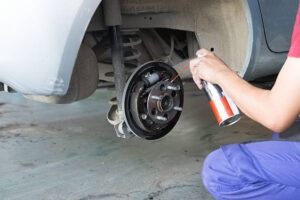
4. Driving Customs:
Avoid driving aggressively to prevent premature wear on your brakes and suspension parts from quick stops and fast twists.
5. Keep It Tidy:
Clean and check the undercarriage of your car on a regular basis. Clear away anything that might become stuck in moving parts and make noise.
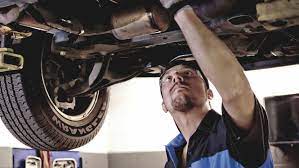
6. Quick Repairs:
Do not put off repairs if you hear any strange noises or detect any problems. Early intervention can stop minor issues from developing into larger ones.
You may considerably lower the likelihood of hearing a metallic screeching sound while driving by adhering to these preventive steps and meticulously maintaining your car.
Conclusion:
Therefore, a car’s metal screeching sound when driving may be an indication of more serious technical issues. It’s essential to comprehend the root reasons and act swiftly to remedy them. Finding the source of the noise and addressing it is crucial for your peace of mind and the safety of other road users, whether it involves changing out worn brake pads, tightening loose belts, or repairing suspension problems. To ensure a quieter and safer driving experience, keep in mind that regular maintenance and swiftly addressing problems can help you prevent costly repairs in the long term.


